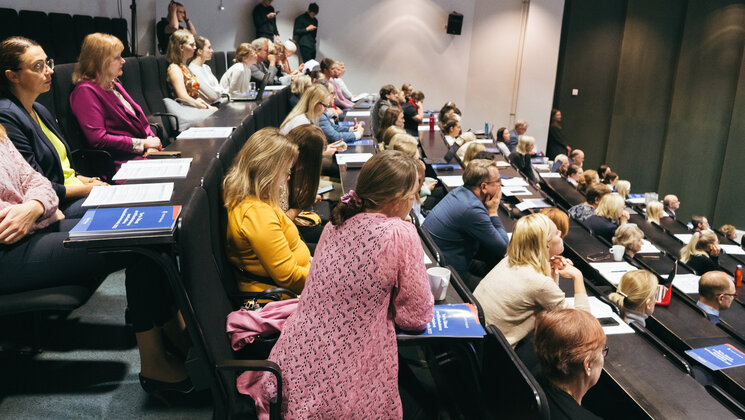Research of the Institute of Family Medicine and Public Health
Main research areas at the Institute of Family Medicine and Public Health are risk-taking health related behaviour, risk factors of noncommunicable and communicable (HIV) diseases; environmental and occupational health risks and related intervention strategies; health technology assessment and medicine and public health.
Here you find our institute ongoing research projects:
Project name: Mapping and Analysis of Practices of Other Countries for the Prevention of Injuries in the Home Environment in Estonia
Project period: 30.11.2021−30.05.2022
Principal investigator: professor Ruth Kalda, ruth.kalda@ut.ee
The aim of the study is to analyse the research-based practice of other countires in the field of injuries happening at home.
Project name: Cost-effectiveness of gender-neutral HPV vaccination
Project period: 11.11.2021−30.06.2022
Principal investigator: associate professor Mikk Jürisson, mikk.jurisson@ut.ee
The report aims to estimate the health and economic impact of gender-neutral HPV vaccination compared to the vaccination of girls only.
Project name: Comparison of the Impact of Ambient Air Quality on Human Health in Estonia in 2010 and 2020 and Forecast of the Health Effects of Air Pollution by 2030
Project period: 25.10.2021−15.08.2022
Principal investigator: associate professor Hans Orru, hans.orru@ut.ee
The aim of the project is to find out how much air quality affects the health of the Estonian population in 2020, how this has changed compared to 2010 and what is the forecast for 2030.
Project name: COVID-19 active surveillance study-3
Project period: 1.05.2021−31.12.2022
Principal investigator: associate professor Mikk Jürisson, mikk.jurisson@ut.ee
The University of Tartu has initiated a surveillance system for assessing the prevalence of SARS-CoV-2 infection and the level of antibodies in the population. Surveillance enables monitoring of acquired immunity in the population that serves as a basis for an exit strategy and a warning system for the third wave of epidemics.
Project name: Longitudinal study: immune responses following COVID-19 immunization and SARS-CoV-2 infection
Project period: 1.10.2021−30.06.2023
Principal investigator: associate professor Marje Oona, marje.oona@ut.ee
The objective of the study is to assess the need for booster doses of COVID-19 vaccines. The specific aims are: to assess the persistence of immunity after COVID-19 vaccination and the factors influencing it among the adult population in Estonia, and to assess the persistence of immunity after SARS-CoV-2 infection and the factors influencing it in the Estonian adult population.
Project name: Development of personalized medicine solutions in Estonia_training courses
Project period: 1.05.2021−30.06.2023
Principal investigator: associate professor Mikk Jürisson, mikk.jurisson@ut.ee
The aim of the training course is using genome data in primary prevention of chronic diseases (cardiovascular diseses, diabetes) in primary health care in Estonia. Attending family practitioners and nurses will be introduced to the modern genomics and disease risk assessment and prevention using innovative decision supporting tools and methods.
Project name: Towards elimination of cervical cancer: intelligent and personalised solutions for cancer screening
Project period: 1.02.2020–31.07.2023
Principal investigator: professor Anneli Uusküla, anneli.uuskula@ut.ee
Our proposed research seeks to develop a predictive medicine application by applying high-performance computing and analytics to clinical, biological, and population data.
Project name: Enhancing Belmont Research Action to support EU policy making on climate change and health
Project period: 1.11.2020–31.10.2023
Principal investigator: associate professor Hans Orru, hans.orru@ut.ee
ENBEL will support EU policy making by bringing together leaders in climate change and health research. We do so by coordinating a network of major international health and climate research projects under the Belmont Forum’s Collaborative Research Action (CRA), Societal Challenge 1 and 5 of EU’s Horizon 2020, and other national and international funding schemes. The network will develop evidence syntheses and co-produce with stakeholders a series of tailor-made knowledge products.
Project name: Development of the clinical guidelines
Project period: 1.01.2020−31.12.2023
Principal investigator: professor Ruth Kalda, ruth.kalda@ut.ee
The aim of the contract is to develop and evaluate the quality of health care in Estonia. For this, the academic knowledge and clinical competence of the best medical experts at the University of Tartu will be utilised.
Project name: Centre for Health Technology Assessment 2022 - 2024
Project period: 1.01.2022 - 31.12.2024
Principal investigator: associate professor Mikk Jürisson, mikk.jurisson@ut.ee
The UT Health Technology Assessment Centre provides an evidence-based assessment of new health technologies for the Estonian Health Insurance Fund. The purpose of such assessment is to make sure that the new innovative heath technologies are both effective (ie the implementation is associated with a positive health impact) and cost-effective (ie the price the public health insurance pays for the service is reasonable).
Project name: Working collaboratively with vulnerable women to identify the best implementation gains by screening cervical cancer more effectively in European countries
Project period: 1.03.2021−28.02.2026
Principal investigator: professor Anneli Uusküla, anneli.uuskula@ut.ee
The aim of CBIG-SCREEN: To create a Europe-wide knowledge framework about the barriers for accessing cervical cancer screening, and to inform the policies, programmes, communications, and other required actions to effectively serve vulnerable subpopulations of women with inherent high risk for cervical cancer and low (perceived) access to proper healthcare routes. We aim to deliver tailored cervical cancer screening programmes for subgroups of vulnerable women, which we believe will accelerate elimination of cervical cancer in Europe.
The Approach: Through stakeholder engagement, mathematical analyses, and structured reviews of current policies, the consortium will create a deep understanding of current shortcomings and opportunities for improvement. This will be directly translatable to tailored sub-programmes geared at vulnerable subpopulations. By generating evidence on effectiveness and sustainability of such tailored strategies, we will facilitate evidence-based policy making.
H2020 Grant Agreement number: 964049 — CBIG-SCREEN
Read more https://cbig-screen.eu/



